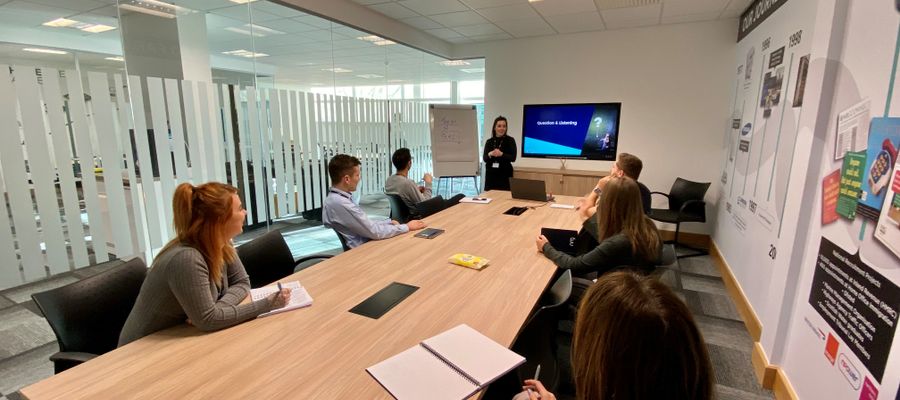If you work in either HR, L&D, Recruitment, or you’re a business looking for People Professionals who specialise in people development, you’ll know that they are in high demand right now.
It is no coincidence that people agendas, and those who drive them, are ensuring organisations retain their talent and produce a highly productive workforce.
At the beginning of the COVID-19 pandemic, L&D professionals and some HR practitioners were either furloughed or made redundant as their role wasn’t deemed as necessary for making money - particularly in a time full of uncertainty. Fast forward to now. Business leaders are recognising that the hunt for great talent is here, and that their ‘human capital’ needs to be engaged, happy, and developed. That’s where People Professionals come in. It’s a candidate’s market, and businesses need to look at what candidates want.
Businesses performing well depends on their people showing up and helping to fulfil the director’s strategy and ideals. No longer are L&D strategies considered the bucket to catch the leak in your roof; they are put front and centre to design and deliver programmes which have real long-term effects.
I started my career as an L&D professional in a large firm with many L&D resources at our fingertips. The business had a high number of consistent performers who had been in post for up to 20 years.
And it is no surprise that big brands such as Virgin, Google and other giants attract and retain great people as they have good L&D provisions.
What is the secret?
We continued to evolve and introduce more effective learning programmes, such as trainee academies, mentoring partnerships, graduate schemes, future leader programmes, and feedback programmes for all levels of staff. This included business improvement initiatives, which helped those who were struggling reach their full potential.
L&D was a directive from the top, fully encompassed and respected by all levels of the business. We were reacting to what the market needed, aligning initiatives to the business strategy.
Moving onto my role now at NRG, we are doing the exact same thing and understanding that skills development leads to confidence, happiness, engagement, and productivity from employees who are achieving. And achieving leads to rewards. It’s a great trajectory to be on – both the people and the business benefits.
We recently had one of our best months to date in regards to profit. The introduction of new business processes, mapped out with strategic learning aligned to our goals, clearly works!
Here is the dilemma according to a CIPD report: fewer than half (47%) of UK employees agree that their jobs offer good opportunities to develop valuable skills, and that the learning provision is not fit for purpose.
When we know learning & development is so vital, why do we have such a disconnect?
Is it that leaders can be too stuck in the ‘now’ to plan for the future and create a long-term win from Learning & Development?
The CIPD report also states that ‘We can infer here that when an organisational culture allows employees to learn on a continual basis, while being supported by line managers, they show greater commitment towards their business, which in turn reduces their intention to leave. Given the outcomes discussed above, it’s important to consider what professionals and the organisations in which they work can do to support learning.’
The risks of not offering development opportunities for your staff are too high in our marketplace. Job seekers are being more selective about where they invest their time and commitment. They want to get back what they put in. Companies need to understand what their staff are thinking.
Equally, chucking some learning onto the floor that doesn’t meet your people’s needs would be counter intuitive. It’s not about ticking a box. It’s about investing in your staff to enable them to be the best they can be.
Advice on where to start
My advice for those currently without a people development plan is to:
Analyse where your productivity is low and where it is high. What are the reasons for this? Your results should enlighten you to specific training needs.
Ask your people what they would like in terms of development. Is it skills-based, jobs-based or more wellbeing orientated? Skills development doesn’t have to be based on the job itself.
Gauge what people want and how that relates to the overarching business strategy, and then move forward with those ideals in mind.
Here are a few pointers as to how you could start, depending on your budget:
Set up a buddy system with experienced and new colleagues
Create a formal mentoring programme
Partner with Apprenticeship Providers and make use of the levy
Ask successful incumbents to run fun ‘lunch and learns’
Hire external coaches to deliver on expert topics
Of course, you could take a leap and add that L&D professional to your team formally – you won’t regret it!
There are plenty of ways to prioritise your L&D – and as a result your staff – no matter your budget. It’s entirely possible to take the first step just by asking the important questions.
With all that in mind, why don’t you give people development a try and reap the rewards on your bottom line…
Kirsty Russell is our Head of Talent and Operations.


